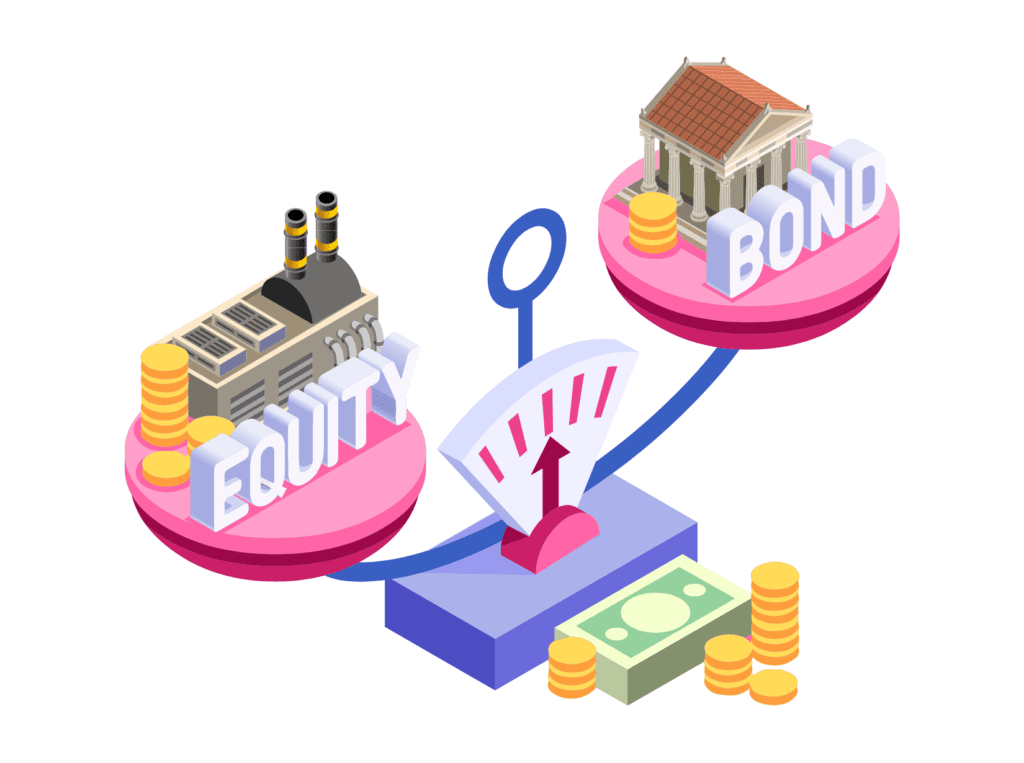Have money to invest but have no idea how to create an investor’s goal?
We got you covered.
Here we’ll go over 8 fail-proof steps explained in-depth on how to set and achieve your investment goals.
In fact, these steps below have allowed my wife and me to become millionaires before 36!
So if you want to know how to define your risk tolerance, what to invest in, or how often you should be checking in on your investment objectives, check out the helpful read below.
Let’s jump right in.
What Are Investment Goals?

Your investment goals are the things you hope to achieve by investing. They might include saving for long-term goals like retirement, buying a home, sending your children to college, or starting a business.
Some people generate income, while others invest in growing their wealth. And some people do both.
What Are The 2 Main Types Of Investment Goals?
Cash Flow
Cash flow investments can be short and long-term, with variable time horizons. These investments aim to provide the investor with a steady stream of income rather than capital gains.
There are many benefits to investing in cash flow investments. First, they offer the stability that other investments may not. This is because the income from these investments is relatively predictable, making them ideal for those looking for a reliable source of income.
Second, cash flow investments tend to be less volatile than other investments. This means they are less risky and provide a lower potential for loss.
Finally, cash flow investments offer the potential for high returns. This is because the investor is paid a fixed interest rate on the investment, which can be higher than the return on other types of investments.
Investing in cash flow is an excellent way to ensure a steady income stream.
So if any of that interest you, you might try looking into rental properties or dividend stocks.
Capital Growth
A capital growth investment is an investment that aims to increase in value over time. This type of investment is typically made in stocks, bonds, and real estate assets.
There are several benefits to investing in capital growth investments. First, they offer the potential for long-term growth. This is because the value of these assets tends to increase over time.
Second, capital growth investments are typically less volatile than other investments. This means they are less risky and provide a lower potential for loss.
Finally, capital growth investments offer the potential for tax-deferred growth. This means that the investor can defer paying taxes on the asset until sold.
Investing in capital growth is an excellent way to grow your wealth.
So if you’re looking to invest for the long term, you might want to consider investing in stocks, bonds, or maybe even crypto.
Why Are Investing Goals Important?
For me, the number one reason is financial independence.
But there are some other benefits as well.
For instance, they provide a clear and concise roadmap for best utilizing your funds. In addition, by having an investing goal, you can more easily decide where to invest your money and how much risk to take on.
There are many different types of investing goals, but some common ones include saving for retirement, saving for a child’s education, or simply trying to grow your wealth. Setting investing goals and sticking to them can help you make the most of your money, no matter your specific goal.
One of the best things about investing goals is that they can help keep you disciplined. It can be easy to get caught up in the excitement of the stock market and make impulsive decisions. Having clear goals can help ground you and focus on what’s important.
Investing in goals can also help you stay motivated. It can be easy to get discouraged when the market is down, or your investments are not performing as well as you had hoped. But if you have a specific goal in mind, it can be easier to stick with your investment plan and ride out the ups and downs.
No matter your goals, setting and following through on them can help you make the most of your money. Investing is a long-term game, so it’s critical to have a plan and stay focused on your long or short-term goals. By doing so, you can increase your chances of achieving your financial goals.
How To Set Investment Goals (8 Fail-Proof Steps)
You’re here.
You now know what investment goals are and why they’re important.
Now let’s show you how to effectively and efficiently create them so you can start making that Oprah Winfrey money. 😁
Check out the helpful list below.
1. Figure Out The Investment Purpose (The WHY)
Before you can begin investing, you need to know why you’re doing it. What are your investment targets? Do you need to save for retirement? Do you want to send your kids to college? Or do you want to grow your wealth? (Pro Tip: A money vision board can help you clarify your goals.)
Once you know your goals, you can look at different investment options and figure out which ones will help you best achieve those goals. For example, if you need to save for retirement, you might want to invest in a 401(k) or an IRA. On the other hand, if you’re looking to grow your wealth, you might want to invest in stocks or real estate.
No matter your goals, it’s crucial to understand why you’re investing before you begin. Only then will you be able to make wise, informed decisions about where to put your funds.
2. Define Your Risk Tolerance
Before investing, it’s essential to understand your risk tolerance. This refers to the risk you’re comfortable taking on when investing. Risk can be measured in several ways, but essentially it boils down to the chance of losing money on your investment.
There are many ways to figure out your risk tolerance. One way is to think about how you would feel if your investment lost money. Would you be able to stomach the loss, or would it cause you a great deal of financial stress?
Another way to measure risk tolerance is by looking at your investment goals. For example, if you’re investing for retirement, you may be willing to take on more risk than investing for a short-term goal, like a new car.
Once you have a good understanding of your risk tolerance, you can look at different investment options. However, it’s important to remember that all investments come with some level of risk. In addition, even the safest investments can lose money, so it’s crucial never to invest more than you’re comfortable with losing.
3. What Do You Want To Invest In?

Investing is an awesome way to reach your financial goals. But before you start investing, it’s essential to know what you want to accomplish.
Do you want to retire early? Build up an emergency fund? Save for a down payment on a house?
Knowing what you want to achieve will help you choose the right investments. For example, if you’re retiring early, you might invest in stocks that pay dividends. Dividend stocks can provide a fixed income stream, which can be helpful if you’re trying to reach a financial goal.
And if you did want to invest in dividend stocks, you could use the user-friendly app Robinhood to find a stock that fits your goals, purchase it, then watch your financial dreams flourish!
Investing is a really great way to reach your financial goals in life. But before you start investing, it’s important to know what you want to accomplish.
4. How Much Will The Total Investment Be?

The first step in allocating your investment funds properly is knowing how much cash you will need to invest. This may seem daunting, but it is actually pretty simple. First, you need to calculate the total amount of money you want to invest and divide it by the number of months you wish to invest.
For example, let’s say you want to invest $2,000 a month. You would first calculate the total amount of money you want to invest, $2,000 x 12, for $24,000. Then, you would divide that number by the number of months you wish to invest, which in this case would be 12. This would give you a monthly allocation of $2,000.
Once you know how much cash you need to invest each month, you can start budgeting and allocating your funds accordingly. This will help you make the most of your investment dollars and achieve your financial life goals.
And if you want to know how to create a family budget or even make organizing personal finances a pleasant experience, I highly recommend the free money management Personal capital!
You can organize your finances and get free professional advice, all from your couch seat with Personal Capital.
What are you waiting for!?
Get Personal Capital, organize your finances, and start making tons of returns on your investments!
5. How Long Will The Investment Timeframe Be?
Investing requires a bit of planning and foresight. First, you need to know how long you’re willing to commit your money before you start investing. This is important for a few reasons.
The longer you’re invested, the more time your money has to grow. This is important if you’re aiming to reach a specific financial goal.
Secondly, knowing how long you’re willing to commit gives you a better idea of what kind of investments are appropriate. For example, riskier investments tend to have higher potential rewards, but they also have the chance of short-term losses. So if you’re only planning on being invested for a short period, it’s generally best to steer clear of these investments.
So, before you start investing, sit down and think about how long you’re willing to commit your money. This will help you make smarter, more informed life and investment decisions.
6. Where Will You Get The Money For The Investment?

It’s essential to know how you will fund your investment because, without the proper funding, your investment may not be successful. There are many ways to fund an asset, such as using savings, taking out a loan, or finding an investor. Each option has its pros and cons, so choosing the best option for you and your investment is important.
If you’re not sure where to get the money for your investment, there are a few things you can do. You can start by looking at your financial situation and seeing if you have the savings to cover the investment. If you don’t have savings, you can look into taking out a loan from a bank or other financial institution. You can also look for investors who may be interested in funding your investment.
No matter where you get the money for your investment, it’s essential to make sure that you have a plan for how you will use the funds. Make sure to invest only what you can afford to lose and always have a plan for how you will repay any debts you incur. With a well-thought-out plan, you can increase your chances of success with your investment.
7. What Is The Frequency You Will Be Allocating Funds?
This is an important question to ask when you are starting to invest. The frequency with which you allocate funds will impact your investment plan.
For example, if you plan to have $1 Million invested in the S&P 500 in 20 years, you need to make sure you have a good frequency for depositing money, maybe monthly.
If you cannot deposit funds regularly, your plan may not be successful. Therefore, you need to make sure you have a good frequency to reach your investment goals.
Frequency is important because it allows you to reach a life investment goal. Make sure you have a good frequency to succeed in your investment plan.
8. Checking Routinely On Your Investment Goals

It’s important to keep track of how your investments are occasionally doing. This will help you determine if you need to change your investment strategy. It’s also helpful in keeping you motivated to stay the course. Here are a few tips on how to check in on your investment goals:
- Know what your goals are. This may seem like a no-brainer, but you’d be surprised how many people don’t have a clear idea of what they’re trying to achieve with their investments. Write down your goals and be as specific as possible.
- Keep track of your progress. This can be as simple as setting up a spreadsheet to track your investments’ value over time. Or, if you’re working with a financial advisor, they may be able to provide you with regular updates.
- Review your goals periodically. At least once per year (not just once a life), take a look at your short and long-term plan and see how you’re progressing. This will help you make any necessary adjustments to your portfolio.
- Don’t get too caught up in the details. It’s essential to stay focused on your overall goals and not get too wrapped up in the day-to-day fluctuations of the money market. Remember, be realistic; the goal is to reach your targets in the long run, not make a quick profit.
- Seek professional help if needed. If you’re unsure where to start or feel overwhelmed, you may want to consider working with financial advisors. They can help you develop a personalized investment plan and give you peace of mind that your investments are on track.
Keeping track of your investment goals doesn’t have to be complicated. You can stay on track and reach your targets by following these simple tips.
FAQ
What Is The Goal of Investing?
The main goal of an investor is to make money. This can be done in several ways, but the most common is investing in something that will increase value over time. This could be a piece of property, a business, or a stock.
What Makes A Good Investment Goal?
There is no single answer to this question because everyone’s situation and goals are different. However, some general tips for making a good investment goal include thinking about what you want to achieve, setting a realistic and achievable goal, being specific about your goals, and creating a timeline for achieving your goal.
How Much Do I Need To Save For An Investors Goal?
There is no one-size-fits-all answer to this question, as the amount you need to save will vary depending on your goals and circumstances. However, as a general rule of thumb, you should aim to save at least 10% of your income for investments.
What Is The Most Common Goal For Most Investors?
For most investors, the primary goal is to generate income through their investments. This can be done through various methods, including dividends, interest, and capital gains. Many investors also seek to grow their portfolio over time by reinvesting their earnings and adding new investment vehicles.
Should I Talk About My Financial Goals
There is no right or wrong answer to this question; it all comes down to personal preference. Some people enjoy talking about their financial goals and experiences, while others prefer to keep this information private. It’s important to be honest with yourself about what makes you comfortable and choose an approach you’re likely to stick with.
Summary
So what are you waiting for?
It’s time to set your investing goals and then achieve them!
Remember, these goals should be tailored to YOU and what will make you successful. Nothing can stop you from becoming a successful investor with the right mindset and a plan of action.
Go get ‘em!
What type of investment will you pursue?
Will you use Robinhood to invest in dividend stocks?
Or will you go the more active route and invest in real estate?
Hello! I'm Charles. 1st gen millionaire, real estate investor, health enthusiast, and military veteran. In the last 17 years, I have managed billions of dollars of resources for the Department of Defense. Created financial management plans that enabled fellow service members to get out of thousands of dollars in debt and tailored wellness plans that helped people reverse and eliminate high-blood pressure, pre-diabetes, and obesity. Learn more about me here.